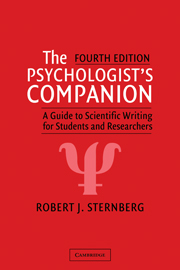Book contents
- Frontmatter
- Contents
- Acknowledgments
- Introduction
- 1 Eight Common Misconceptions about Psychology Papers
- 2 Steps in Writing the Library Research Paper
- 3 Steps in Writing the Experimental Research Paper
- 4 Rules for Writing the Psychology Paper
- 5 Using the Internet to Aid the Research Process
- 6 Commonly Misused Words
- 7 American Psychological Association Guidelines for Psychology Papers
- 8 Guidelines for Data Presentation
- 9 References for the Psychology Paper
- 10 Standards for Evaluating the Psychology Paper
- 11 Submitting a Paper to a Journal
- 12 How to Win Acceptances from Psychology Journals: Twenty-Nine Tips for Better Writing
- 13 Writing a Grant or Contract Proposal
- 14 How to Find a Book Publisher
- 15 Writing a Lecture
- 16 Article Writing 101
- References
- Appendix A Sample Psychology Paper
- Appendix B Writing for British and European Journals
- Index
1 - Eight Common Misconceptions about Psychology Papers
Published online by Cambridge University Press: 05 June 2012
- Frontmatter
- Contents
- Acknowledgments
- Introduction
- 1 Eight Common Misconceptions about Psychology Papers
- 2 Steps in Writing the Library Research Paper
- 3 Steps in Writing the Experimental Research Paper
- 4 Rules for Writing the Psychology Paper
- 5 Using the Internet to Aid the Research Process
- 6 Commonly Misused Words
- 7 American Psychological Association Guidelines for Psychology Papers
- 8 Guidelines for Data Presentation
- 9 References for the Psychology Paper
- 10 Standards for Evaluating the Psychology Paper
- 11 Submitting a Paper to a Journal
- 12 How to Win Acceptances from Psychology Journals: Twenty-Nine Tips for Better Writing
- 13 Writing a Grant or Contract Proposal
- 14 How to Find a Book Publisher
- 15 Writing a Lecture
- 16 Article Writing 101
- References
- Appendix A Sample Psychology Paper
- Appendix B Writing for British and European Journals
- Index
Summary
Misconception 1. Writing the psychology paper is the most routine, least creative aspect of the scientific enterprise, requiring much time but little imagination.
Many students lose interest in their research projects as soon as the time comes to write about them. Their interest is in planning for and making new discoveries, not in communicating their discoveries to others. A widely believed fallacy underlies their attitudes. The fallacy is that the discovery process ends when the communication process begins. Although the major purpose of writing a paper is to communicate your thoughts to others, another important purpose is to help you form and organize your thoughts.
Reporting your findings in writing requires you to commit yourself to those findings and to your interpretation of them, and opens you to criticism (as well as praise) from others. It is perhaps for this reason as much as any other that many students are reluctant to report their research. But the finality of a written report also serves as a powerful incentive to do your best thinking, and to continue thinking as you write your paper. It requires you to tie up loose ends that you might otherwise have left untied. As a result, reporting your findings presents just as much of a challenge as planning the research and analyses that led to those findings.
- Type
- Chapter
- Information
- The Psychologist's CompanionA Guide to Scientific Writing for Students and Researchers, pp. 6 - 18Publisher: Cambridge University PressPrint publication year: 2003



